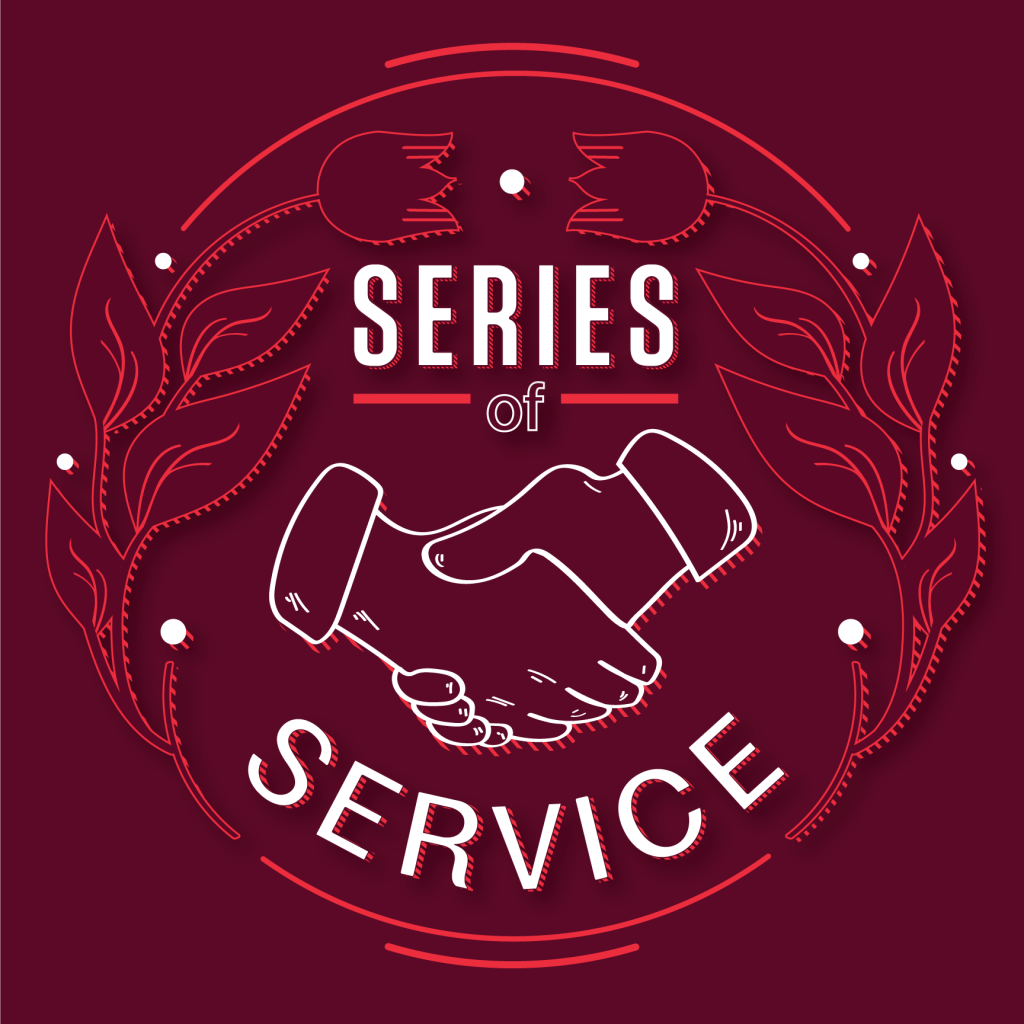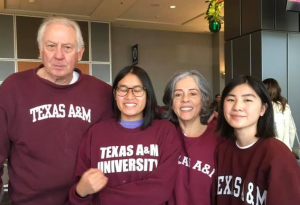Sam Buford ‘68: A successful lawyer with a passion for liberal arts
Sam Buford ‘68 attended Texas A&M University before the College of Liberal Arts existed on campus. Today, he encourages bright students like his daughter to study the liberal arts.

By Rachel Knight ‘18
Editor’s Note: The following is a Series of Service feature from the College of Liberal Arts.
The series highlights individuals who give generously of their time and resources as members of either the Liberal Arts Development Council or the Liberal Arts Advisory Council. Life-long learning and humanities research that matters at Texas A&M University would not be possible without this support.

Sam Buford ’68 and his family help spread their passion for global education by supporting the College of Liberal Arts.
Sam Buford ‘68 graduated from Texas A&M University with an accounting degree without applying for post-graduation jobs. His plan was to join the Army before being drafted for Vietnam. He turned in his Army paperwork, traveled to Houston, completed his initial evaluations, but failed the physical.
Feeling lost, Buford decided to go to graduate school. He completed a master’s degree in accounting at Texas Tech University. He then went to work for a CPA firm in San Antonio. After just one tax season, Buford knew he did not want to do tax returns for a living. He decided to enroll in law school and obtained a master’s degree in tax law from New York University.
Since 1979, Buford has put his law degree to good use working in Austin as a licensed tax and corporate lawyer. Today he enjoys seeing the changes that have been made on campus when he visits his daughter, who is a proud College of Liberal Arts student. We chatted on the phone with Buford to learn more about his story, his time at Texas A&M, and the legacy he plans to leave. This interview, which has been edited for clarity, may awe and inspire you.
Tell me about your childhood.
I was born in 1945, the first child of three. We lived on a farm in a little town called May, Texas, about 10 miles from Brownwood. We lived in a house that had no running water, no electricity, we cooked on a wood stove, had a dirt floor, and we had an outdoor toilet. We didn’t have glass in all the windows. We had some kind of paper to cover them.
My father at that time was a dry land peanut farmer, so in 1950, he went broke. We moved from Brown County out to Odessa, Texas. We took everything we owned or had in the back of a Greyhound Bus.
When we landed in Odessa, he went to work in the road construction business and later in the oil field business. I lived there until I graduated from high school and went off to college.
What was your first job?
My first job started one summer in high school. There was a road construction company called Jones Paving. I worked as a flagman on a crew where they were paving roads out in the country. Pay was $1.20 an hour. It was not a pleasant job.
I realized real quickly that I didn’t want to be a flagman on a road crew for the rest of my life. I was just a sophomore in high school, so I don’t think it influenced me that much. Only that I knew I wanted bigger and better things out of life than that.
How did you decide to study at Texas A&M University?
My mother went to some kind of business school, but she wasn’t educated. My father quit school in the seventh grade. He was not educated. Somehow or another I stumbled onto the right path and was able to go to Texas A&M.
My best friend in high school’s father went to Texas A&M. He was in the Corps, and I think he got out in 1945 or ‘50, right around the time I was born. He talked about Texas A&M a lot. I also dated a girl in high school whose father went to Texas A&M.
I had the influence of those two people, and then the more I looked into Texas A&M the more I thought that’s where I want to be. It wasn’t a hard choice for me frankly. I never considered going to UT. Even back then, Texas A&M was special to me.
What makes Texas A&M special to you?
While I was a student at Texas A&M the Vietnam War was going on, and at UT they were marching and raising hell about the war. We didn’t do that at Texas A&M.
Rudder was president of Texas A&M while I was there. We had just a few black students and we had a few Hispanic students. We didn’t have any girls on campus to speak of. Now I realize he was right in the mix trying to change all of this.
I think the changes that have happened at Texas A&M in the last 50 years are amazing, and frankly I’m proud of it. I’m proud because I went there, but I’m even more proud of what Texas A&M is becoming. When I talk to friends that I went to college with, we all agree that when you look at it now compared to when we were there, it’s a totally different place for the better.
What are some of your favorite traditions at Texas A&M?
The student body and how friendly they are, how open they are, and how willing they are to help other people is pretty special. You don’t find that other places. I have four different degrees from four different universities, and you don’t find that in other places.
I was on campus last spring to take my daughter for an interview. She took an AP test, and I took her over to Old Main. I was walking back to the MSC, and this young guy stopped me and asked if I needed any directions. Everybody is so friendly. That’s a big deal and a big tradition.
Tell me about your daughters.
We have two adopted Chinese daughters. When I was 57, we made our first trip to China. We picked up our oldest daughter, who had been abandoned at an orphanage. Two years later, we went back and got our second daughter, who had also been abandoned in an orphanage. I got the chance to do that and be a father, which is the most significant act in my life.
My older daughter wants to be an international lawyer. She is quite motivated, and is now a freshman at Texas A&M. My youngest daughter is a senior in high school. She’s totally different than her sister, but just as smart. She hasn’t decided what she wants to do with her life. The most important thing to her right now is hanging out with her friends, as it should be.
Tell me about your involvement with the College of Liberal Arts at Texas A&M University.
Broader education is something that is not well understood by people. When I was there, we didn’t even have a College of Liberal Arts. The College of Liberal Arts is an integral part of Texas A&M now.
I had the good fortune to be on the Liberal Arts Development Council. When I first joined, Charlie Johnson, who’s the former Dean, used to call me and two other guys over to his office in the fall and the spring. We’d sit around and talk about the College of Liberal Arts for four or five hours. When I went to Texas A&M, getting to sit down and have a pow-wow with a dean was something I thought would never happen.
I’ve come to believe that these people who learn how to think and write and talk have an advantage over people like myself that learned skills like accounting. Not that I’ve done badly, but for bright students like my daughter, I think going to Texas A&M and getting a degree in broader topics like economics and international studies is ideal. I suspect it will prepare her for so many things.
What drives your personal passion for giving to the College of Liberal Arts at Texas A&M to support study abroad experiences for students?
Years ago, right after my wife and I adopted our two girls, I talked to a child psychologist. He said, “If you have the money and the ability to travel with your kids and to let them travel to other countries, that’s the best thing you can do for them. It teaches them independence and about other cultures.”
I had also just started on the Development Council at that time, and said if I’m going to give money, I want to give money to someone who can really benefit from it. If you go to Italy or France or Spain or England, you experience different cultures and you realize that there’s things that are different and sometimes better than what we have.
If you’re a kid from west Texas, like me, who’s never been anywhere that wasn’t your grandmother’s house, studying abroad is an integral part of your education. It teaches you a lot that you can’t get out of books.
What books are on your nightstand right now?
I just finished reading a book on Earl Rudder. While we were at Texas A&M, we had no sense that Rudder was trying to change things like our demographics for the better. I get a little emotional about that. I got ahold of the book about Rudder, and I read it in about three or four days.
What do you want your legacy to be at Texas A&M University?
My wife and I are not sentimental. I don’t want my name flying above Kyle Field. I don’t want a dorm named after me. I don’t have any of these desires for that kind of stuff. It’s not who I am.
I just want to be thought of as an honorable, good person, thoughtful, a good father. I just want people to have positive vibes with me when everything is over and done with, and I think they will.
